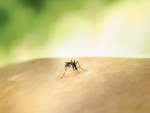As the days lengthen and temperatures rise, the allure of summer activities grows stronger. Swimming, sports, and picnics become synonymous with warmer weather. However, along with these pleasures come the nuisance of insect bites, particularly from mosquitoes, which can easily spoil an outdoor outing. Moreover, mosquito bites aren’t merely irritating; they pose a health risk by transmitting diseases.
The list of mosquito-borne illnesses continues to expand. Some diseases, like malaria, are uncommon in the United States, while others such as dengue fever are spreading in Southern regions as temperatures increase. Additionally, viruses like West Nile are now appearing seasonally across much of the country.
Researchers funded by the NIH are actively engaged in efforts to curb the spread of mosquito-borne diseases. They are exploring methods to prevent mosquito bites and protect those who are bitten from falling ill.
For decades, scientists have pursued the development of vaccines to shield people from mosquito-borne diseases. However, progress has often fallen short due to the sheer number and variety of these diseases, as explained by Dr. Matthew Memoli, an infectious diseases researcher at NIH.
Dr. Memoli and his team are exploring a novel approach: a vaccine targeting mosquito saliva. Mosquito saliva contains compounds that facilitate blood-sucking and enhance the transmission of diseases. By helping the body recognize and respond to these compounds, their vaccine aims to bolster the immune system’s ability to thwart infections. Initial trials have shown promising results in enhancing immune responses and safety, paving the way for further testing in high-risk regions.
Another crucial strategy in disease prevention is deterring mosquitoes from biting in the first place. Dr. Carolyn McBride, a mosquito biologist at Princeton University, underscores the importance of personal repellents like DEET and mosquito nets. However, broader community-level strategies are needed to effectively curb disease transmission.
McBride’s research into how mosquitoes detect humans has revealed specific chemical cues on human skin that attract mosquitoes. This insight could lead to innovative approaches for repelling or trapping mosquitoes across large areas, potentially reducing reliance on individual protection measures.
Efforts to control mosquito populations also involve genetic strategies. Dr. Zach Adelman, a mosquito geneticist at Texas A&M University, discusses the concept of “reduce and replace,” where insecticides are used to reduce mosquito numbers followed by the introduction of genetically modified mosquitoes that are less likely to transmit diseases.
Adelman’s team is exploring genetic modifications that could make mosquitoes less effective at spreading viruses like dengue fever. These modifications are designed to be temporary and reversible, addressing concerns about their long-term impact.
While researchers continue to pursue these innovative approaches, individuals can take immediate steps to minimize mosquito bites.




